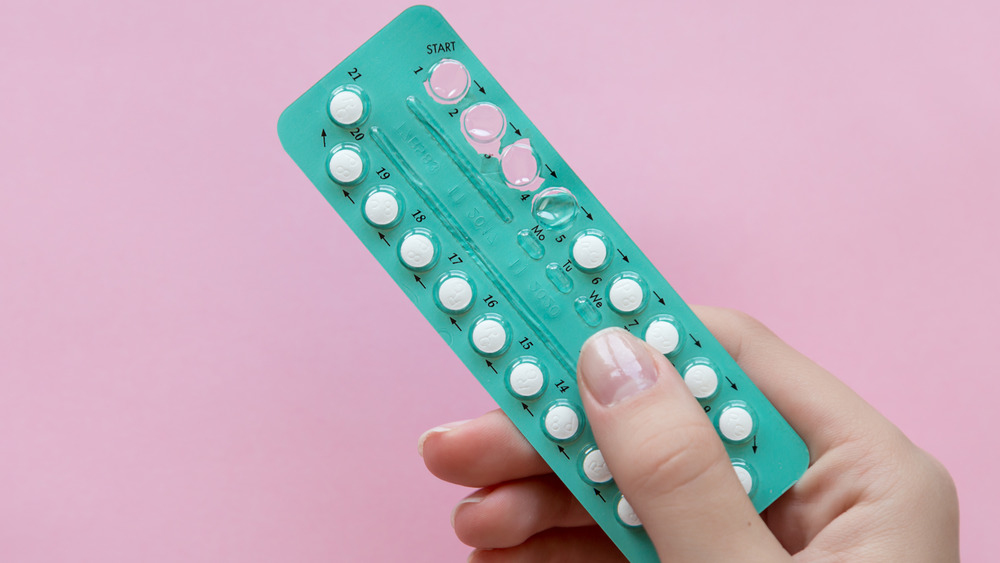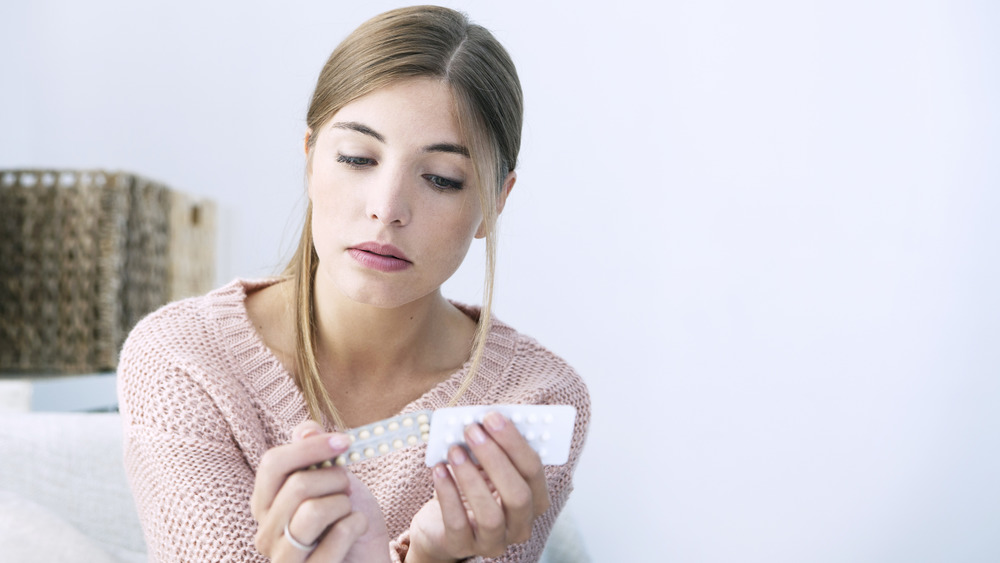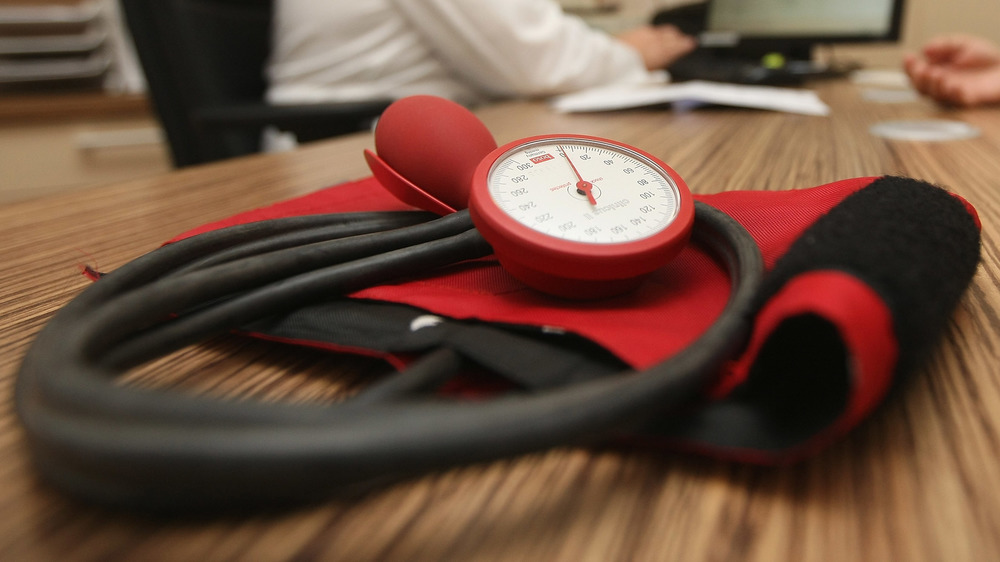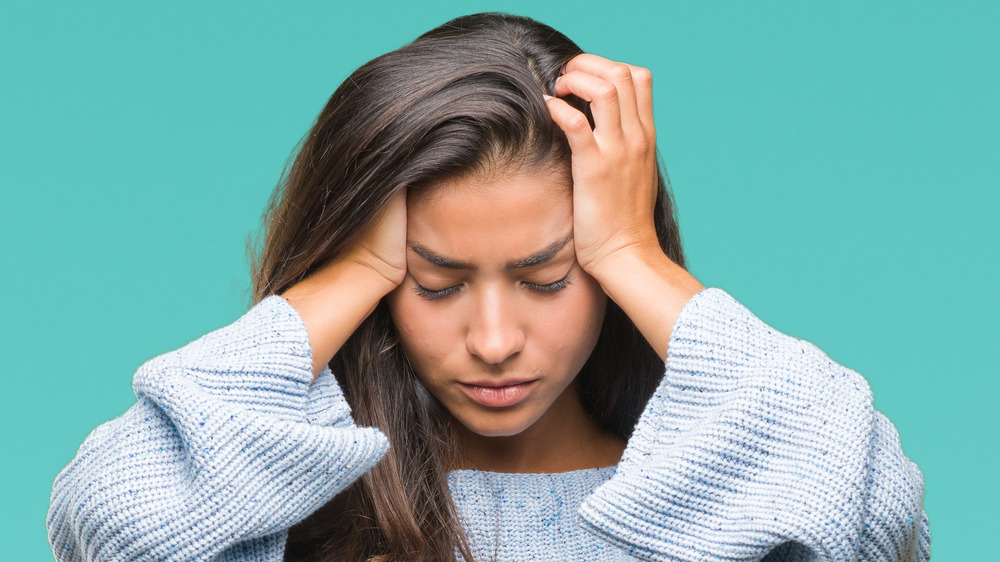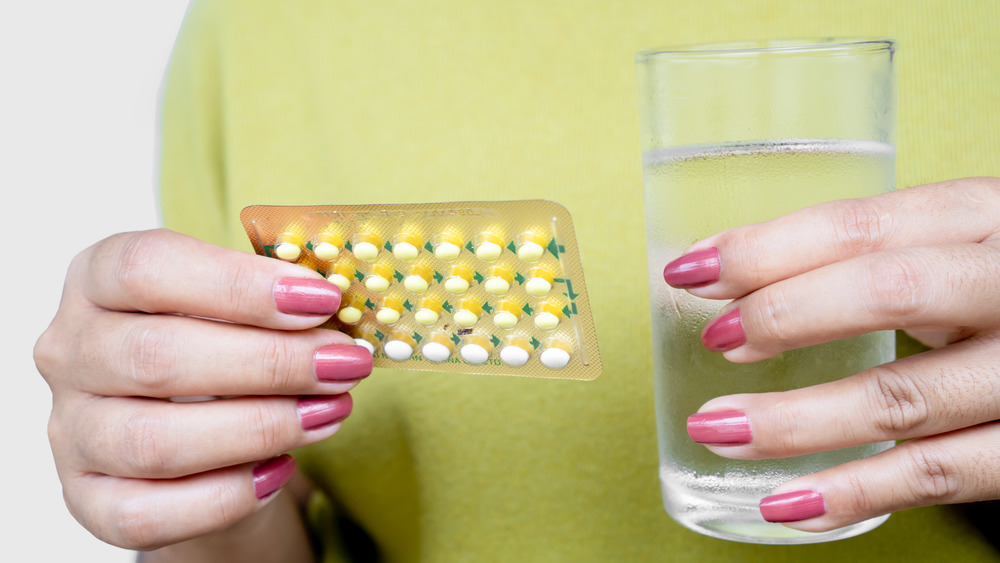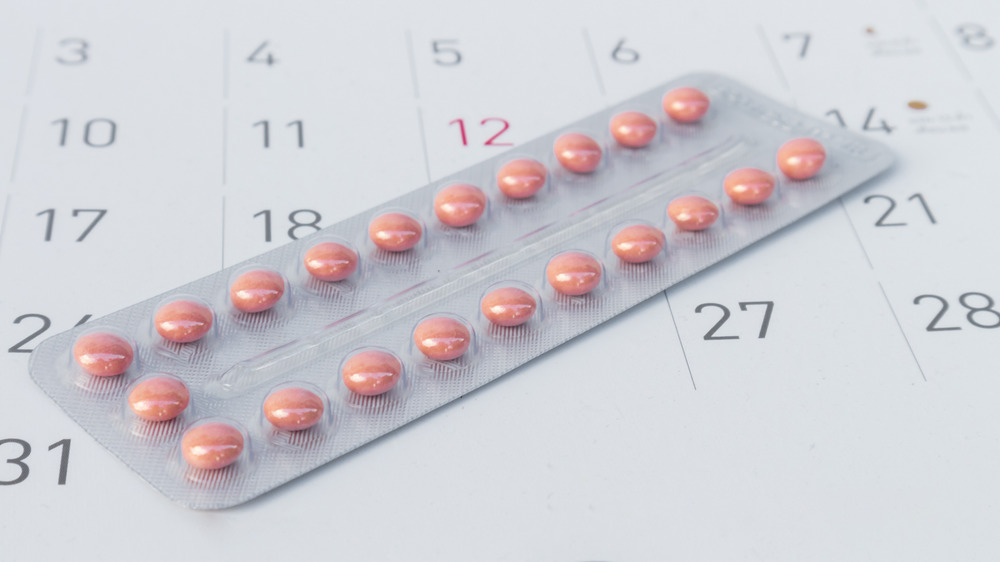When You Take Birth Control, These Things Really Happen To Your Body
When you hear about birth control, the first thing that might come to mind is its ability to prevent pregnancy. That's pretty obvious — it's literally in the name. But what many people don't know are the other benefits, including those for women who aren't sexually active.
A 2011 report by Guttmacher Institute found that while 86 percent of women on birth control pills use it for contraception, 49 percent had an additional reason. Data shows that 31 percent of women take birth control for menstrual pain, 28 percent for period regulation, 14 percent for acne, and 4 percent for endometriosis.
Despite these various benefits, you might have heard that hormonal birth control can cause you to gain a bunch of weight or even affect your ability to have children in the future. Common misconceptions and myths about birth control abound, making it hard to discern what's fact and what's fiction. Here's the truth about birth control and how it affects your body.
When you take birth control, you'll have elevated levels of estrogen and progesterone
A majority of birth control works by increasing hormone levels. Sara Pentlicky, an OB-GYN at Einstein Medical Center in Philadelphia, Pennsylvania, told Health Digest that increased progesterone levels make a barrier to block sperm from entering the uterus by thickening the cervical mucus. When combined with estrogen, birth control pills can also suppress ovulation.
The HealthyWomen organization explained that a spike in estrogen levels is the signal to release an egg from the female ovary. However, by continuously releasing hormones, birth control maintains consistent hormone levels, meaning there's no signal for the egg to leave.
A common misconception is that birth control causes infertility. But, Natasha Spencer, an OB-GYN with Orlando Health Physician Associates, told Health Digest that this isn't true. "If women want to get pregnant sooner rather than later, then women should consider birth control pills because it's an easier method to stop once they want to try. If women want to delay having kids for a longer period of time, then LARCs [long-acting reversible contraceptives] such as the Depo-Provera shot, the hormonal implant, or an IUD, would be more recommended."
You'll have fewer acne breakouts on birth control
No need to call Dr. Pimple-Popper; birth control alone can stop acne breakouts. According to Scripps, a not-for-profit health care organization, androgen hormones trigger acne by producing oil called sebum. This oil lubricates the skin and makes it moisture resistant. However, when hormones overproduce sebum, it can clog pores and cause bacterial infection. Because of the rise in androgen levels during their period, women are more likely to experience acne.
Birth control pills help by adjusting for hormonal imbalance. "Using combination birth control pills which has progestin and estrogen can help improve acne and hair growth," OB-GYN Natasha Spencer explained to Health Digest. A 2012 study found six types of birth control pills effective in treating hormonal acne, and a 2014 study found birth control pills as effective as antibiotics in managing acne after six months.
"They can be especially effective in treating stubborn hormonal acne along the jaw, lower face, and neckline when other treatments, such as topical creams and oral antibiotics have not helped," OB-GYN Jonathan Dunn told Scripps. But wait — don't expect clear skin overnight. According to Planned Parenthood, birth control's effects on acne can take up to six months to kick in, and Dr. Spencer said this effect isn't seen in progesterone-only pills.
Birth control may increase high blood pressure in the body
Increased estrogen from birth control pills can increase the risk of developing high blood pressure, Craig O. Weber, a board-certified occupational specialist, explained in an article for Verywell Health. A 2011 preclinical study found that chronic exposure to low amounts of estrogen can cause a superoxide compound to build up in a brain area critical to blood pressure regulation called the rostral ventrolateral medulla. This compound causes stress in the body and stress and eventually, high blood pressure.
The American Heart Association advises that women who are overweight, who have a history of high blood pressure during pregnancy, have a family history of high blood pressure, or have mild kidney disease do not take birth control pills. If you fall under one these risk categories, Verywell Health recommends switching to another form of birth control — that isn't the birth control shot Depo-Provera — or taking a minipill containing only progestin. Unlike combined birth control pills, a 2004 review found "no significant association" between progestin-only pills and high blood pressure even after two- and three-year followups.
Birth control relieves you of period headaches
When Aunt Flo comes to visit, she might bring with her period headaches or menstrual migraines. These headaches that happen during your menstrual cycle are hormone-driven. "Estrogen levels rapidly decline about five days before the onset of the period. That drop in estrogen is thought to trigger a menstrual migraine," Jelena Pavlovic, a neurologist at Montefiore Medical Center, told Insider.
Birth control pills stabilize hormone levels and prevent this rise in estrogen that signals the body to release an egg for potential fertilization. But when it comes to placebo week, birth control's effects backfire. According to The Migraine Trust, a placebo week can cause estrogen levels to plummet, triggering period headaches. For this reason, Sara Pentlicky, an OB-GYN at Einstein Medical Center in Philadelphia, Pennsylvania, recommends using continuous pills instead of a placebo or using a different method, like an IUD, which continually gives a steady dose.
Nevertheless, there is a vast difference between period migraines and regular migraines. Medical News Today reported that people with a history of migraines have an increased risk of stroke in estrogen-containing birth control."We recommend people with aura migraines use a progestin-only birth control," Dr. Pentlicky advised when speaking with Health Digest.
Your mental health may change when you start taking birth control
Birth control can impact mental health, Leela R. Magavi, a psychiatrist and Regional Medical Director for Community Psychiatry, confirmed to Health Digest. "Hormones can impact neural plasticity and the manifestation of one's genetic makeup," she explained.
While there is conflicting evidence on birth control use with anxiety or depression, Dr. Magavi said that in her professional experience, she has had "many adolescents and adults may experience depressive symptoms subsequent to starting birth control." A 2016 study found that birth control use was linked to increased use of antidepressants and likelihood of a first depression diagnosis in adolescents. However, Dr. Magavi said this was a minimal effect. "About 2.2 out of 100 women who utilized hormonal contraception experienced depressive symptoms compared to 1.7 out of 100 who did not."
Additionally, a 2017 study found that using hormonal birth control was associated with an increased risk of both suicide attempts and suicides. However, Dr. Magavi warns not to generalize correlations. Nevertheless, the psychiatrist told Health Digest that she generally advises patients to consider a non-hormonal IUD such as a copper IUD along with low-dose birth control pills for individuals with a family or personal history of psychiatric concerns.
You may have a lower sex drive when using birth control
An unintended way birth control can prevent pregnancy is by losing your motivation to have sex in the first place. Felice Gersh, OB-GYN and founder and medical director of Integrative Medical Group of Irvine, told Insider that birth control pills increase a protein called globulin, which can block sex hormones from testosterone from taking effect.
"Birth control pills increase the liver's production of sex hormone-binding globulin, which literally binds up testosterone — effectively lowering the levels reaching the tissues. Lower testosterone gives lowered sex drive and can lessen the sensitivity in the clitoris and surrounding [vaginal] structures," said Dr. Gersh.
Women may not feel as satisfied in the bedroom as well. Dr. Gersh explained that an unexpected consequence of the pill's ability to thicken the cervical mucus is that it not only blocks sperm but fluid through the vaginal wall. The lack of fluid can make the vagina dry and uncomfortable during sexual penetration.
Your overall risk of dying of cancer decreases when you take birth control
There is no definitive evidence of birth control pills causing cancer, according to the National Cancer Institute (NCI). However, birth control pills may be associated with a small risk of cervical and breast cancer. The NCI explained that birth control makes cervical cells more vulnerable to high-risk HPV infection, and the slight breast cancer risk comes from increased estrogen levels in the body. However, there's no need to panic, Sara Pentlicky, an OB-GYN at Einstein Medical Center in Philadelphia, Pennsylvania, told Health Digest.
"It appears that for every 8,000-plus patients who are using a combined birth control pill, every one new breast cancer case occurs. But we tend to catch those quite early," Dr. Pentlicky explained. A 2017 study found only 13 out of every 100,000 patients using birth control were diagnosed with breast cancer.
Here's some better news: Birth control pills were associated with a decreased risk of endometrial, cervical, and ovarian cancer. The NCI said this is because birth control can suppress endometrial cell proliferation, reduce the number of periods, and decrease bile acid levels in the blood. "With hormonal birth control, the overall risk of dying is lower when looking at all types of cancer," Dr. Pentlicky informed Health Digest.
Your cramps will likely lessen when taking birth control
Say goodbye to the agonizing days of period cramps. Birth control helps immensely with regulating the menstrual cycle to ensure a stable, lighter flow, according to WebMD. And by thickening the uterine lining, your uterine doesn't need to perform contractions to shed it out (via Insider). This relieves menstrual pain such as cramps.
It may also help just to get rid of the period altogether to ease these painful symptoms. "It's a big misconception that you need to have a period. You don't need one every month to feel like everything is functioning fine," Natasha Spencer, an OB-GYN with Orlando Health Physician Associates, advised Health Digest.
"Even if menstrual pain isn't improved with birth control pill itself, prolonged use could allow for a reduction in the number of menstrual cycles," Scott Chudnoff, chair of the obstetrics and gynecology department at Stamford Hospital in Connecticut, told Health Digest. "So, while it may not improve a specific cycle, per se, by decreasing the total amount of menstrual cycles a woman has, you decrease the number of incidences of pain and irregular bleeding."
Your bones can weaken if you use the birth control shot
There is strong evidence that the Depo-Provera shot can negatively impact your bone health. The World Health Organization reported that women who use Depo-Provera can lose up to 5 to 7 percent of bone density in the hip and spine. The loss of bone mineral density happens rapidly in the first two years of use but afterward occurs at a much slower pace. According to the National Women's Health Network, this can put you at an increased risk for bone fractures and osteoporosis.
Depo-Provera works by injecting high amounts of progestin, which sends a message to the brain not to send signals for ovulation, explained The Centre for Menstrual Cycle and Ovulation Research. This prevents estrogen levels from rising, but estrogen is critical for bone development and peak bone mass. Therefore, weakened bones is believed to come from suppressing a form of estrogen called estradiol, per the National Women's Health Network. A 2008 study confirms this as estrogen deficiency was found in women who use Depo-Provera and experienced bone loss.
Luckily, bone loss isn't permanent. "While there are reports that Depo-Provera can decrease bone mass, it's typically reversible once you stop taking it," Scott Chudnoff, chair of the obstetrics and gynecology department at Stamford Hospital in Connecticut, told Health Digest.
You may feel hungrier while using birth control
While the jury is still out on this, an increase in appetite could be linked to birth control use. "Estrogen regulates the appetite centers of the brain's hypothalamus, and on birth control pills that control is compromised and some women lose control and eat too much or too often," OB-GYN Felice Gersh told Insider.
Could an increased appetite explain why some seem to gain weight on the pill? According to Healthline, people do report packing on a couple of pounds after starting the pill, but this is most likely temporary water weight.
Weight gain may also happen with Depo-Provera, Sara Pentlicky, an OB-GYN at Einstein Medical Center in Philadelphia, Pennsylvania, told Health Digest. "With the birth control shot, Depo-Provera, it doesn't appear to be an appetite stimulant, but it may cause fat deposition to happen in a different way." However, she also emphasized that research is still ongoing, and this theory only explains a portion of people on birth control who gain weight.
Birth control may cause you some stomach issues
If you're feeling bloated or nauseous, the estrogen in your birth control pill may be to blame. According to Healthline, estrogen helps keep cortisol, the stress hormone, levels down. However, when low levels of estrogen are present, cortisol levels can rise. This can slow down the digestive process and increase the chances of constipation. Estrogen by itself can also irritate your stomach lining, per WebMD.
Scott Chudnoff, chair of the obstetrics and gynecology department at Stamford Hospital in Connecticut, has a few suggestions to help with nausea. "Sometimes changing the timing of the dates could have some improvements for some GI [gastrointestinal] symptoms," he told Health Digest. "Taking it before bed sometimes works for some women."
When all else fails, it may be worth looking into changing your method of birth control. "In some people with GI issues related to birth control, we will commonly recommend trying another birth control method like the ring to avoid first-pass metabolism," Dr. Chudnoff continued.
Your breasts may get a little bigger when using birth control
Can birth control really cause bigger breasts? Shirin Peters, physician and founder of the Bethany Medical Clinic in New York, told Health Digest that it's true — but there are some caveats. "Breast tenderness and an increase in breast size can occur while taking the combined contraceptive pill. Although these changes are usually mild," she explained.
Medical News Today reported that the sudden onset of synthetic estrogen and progesterone from combination birth control pills can stimulate breast growth in the first few months. However, this is only temporary. After a few months or when a person discontinues treatment, breast size tends to go back to normal.
When it comes to reducing breast tenderness and breast pain, birth control gets a bit complicated. According to Michigan Medicine, birth control pills can help with this discomfort that typically arises before periods. However, the pain and tenderness can also just be an unfortunate side-effect of birth control pills.
You may observe more discharge when taking birth control
An important indicator of your reproductive health is vaginal discharge. This secretion expels unwanted fluid and cells and signifies the body's ability to clean itself, according to Medical News Today. Vaginal discharge commonly occurs around the time of the menstrual cycle and is influenced by hormone levels.
Deborah Lee, general practitioner and sexual and reproductive specialist, wrote in Netdoctor that the body typically has high estrogen levels around day 14 of the menstrual cycle, which can send out vaginal discharge as the body prepares for ovulation. When a person is on birth control, however, blood levels of estrogen rise giving more opportunity for vaginal secretions.
For this reason, Shirin Peters, physician and founder of the Bethany Medical Clinic in New York, told Health Digest that "5 to 10 percent of women taking the pill experience discharge." However, this isn't cause for alarm. "An increase or decrease in normal vaginal discharge can occur with the birth control pill, and neither change is good or bad," Peters continued.
You may be more at risk for blood clots if you take birth control
Elevated estrogen levels can increase the risk for blood clots, according to the Cleveland Clinic. Having a blood clot can lead to a snowball effect of developing an artery and possibly blocking circulation in a vein. Another serious complication includes having a blood clot into the lung, also known as having a pulmonary embolism.
However, Scott Chudnoff, chair of the obstetrics and gynecology department at Stamford Hospital in Connecticut, told Health Digest, "In general, we usually consider the combined estrogen and progesterone pill to be the largest risk factor for the development of blood clots. For the average woman, that risk factor isn't significant enough to caution against using birth control pills."
Deborah Hornacek, a vascular internist at the Cleveland Clinic, added that the risk of blood clots is relatively small considering the low dose of estrogen in modern-day birth control pills. She also explained that women who've just started taking oral contraceptives are more at risk for birth control-related blood clots. "From the first several months up to the first year is the highest-risk time period because your hormone levels are actually changing," she continued.
